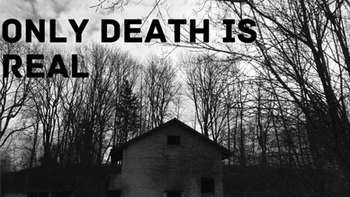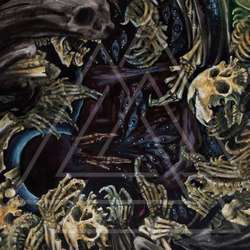Supergroups tend to be either spectacular successes or spectacular failures. Either the musicians work well together, or they don't. Creative differences, personal drama or overgrown egos can easily get in the way when we are dealing with already-established artists.
Twilight is an American black metal supergroup I have had my eye on for some time, but I honestly expected to never hear anything from them again after 2005's self-titled debut. This is mainly because the group's original incarnation included some of American black metal's more polarizing personalities. Not to single out Malefic of Xasthur (whom I greatly respect as a musician), but considering how hostile he is toward working with other musicians, I did not think the band would be able and/or want to release a follow-up. I figured the line-up was just too good to last... one album and things would just fizzle out.
But lo and behold, Southern Lord drops Twilight's sophomore effort, Monument To Time End and what a beast of a progressive black metal album it is. The album boasts an altered and rejuvenated lineup, but I will get to that in a minute.
Firstly, where Monument departs from the debut is that, according to Southern Lord, it "was written entirely collaboratively by the five members of Twilight." The debut album was composed in pieces, and it is up to conjecture whether all the members were ever in the same place at the same time. And it showed, giving the album a somewhat disjointed sound. At its best the album is chilling masterpiece ("Woe Is the Contagion," "As the March of Worms") but at its worst it came across as ill-conceived clusterfuck. Make no mistake, I thought it was a good USBM album, but considering who was involved it could have had a better, more organic flow to it.
So, not only is there a new approach on Monument, but some new talent as well. The main difference is the addition of Aaron Turner (Isis) on vocals and guitar. He was the reason I was so excited about this album in the first place. Word on the street was he would be replacing Malefic. Although Malefic is no longer part of Twilight, I don't know if "replace" is quite the right word. Aaron Turner playing black metal? Like, no way! And his presence does shine through: the guitar sound is considerably beefed up on a few songs (the opener, "Cryptic Ascension" being the best example) and his burly man-vocals add some new texture. Also, there's Sanford Parker (Minsk) contributing some epic synths on the album (and producing!), as well as Stavros Giannopolous (The Atlas Moth) on guitars and some guest vocals from Robert Lowe (Lichens). I really wish they would have used Lowe a bit more; his chilling ambient work leads me to believe he would be an asset to a black metal project like this.
Even though he primarily contributes the rhythm section to Twilight's sound, I sense that Wrest is a driving creative force in the group. I came to this conclusion becase the songs on this album that bear the disctinctive Leviathan/Lurker of Chalice sound also happen to be the strongest ("Fall Behind Eternity," "Convulsions In Wells of Fever," "Negative Signal Omega" and the outro of "8,000 Years," to name a few). Obviously, Blake Judd of Nachtmystium does a lot for Twilight with his guitar and vocals, but it's just that everything Wrest touches turns to awesome and it wouldn't be the same band without him.
I get the impression that the big idea with this album was to do something "different" from most black metal out there, which could have backfired on a couple of levels, but fortunately for us that is not the case. Yes, some tracks are stronger than others, but the transition from fast and technical to grating and electronic to slow and brooding to archaic and folksy encompasses the entire length of the album and makes for a dynamic sound. What makes it different is that it isn't overly obsessed with atmosphere... it's about atmosphere and musicianship.
The album's got everything I like about new Nachtmystium, everything I like about Leviathan, plus visionaries like Aaron Turner, Sanford Parker and Robert Lowe all in one place. Not only that, but it kind of transcends these distinctions to become more than the sum of its parts. Some of the musical passages you could almost call "daring" for black metal, without ever leaving the genre totally behind. There are places where it kind of meanders in unexpected directions ("Red Fields" and "The Catastrophe Exhibition") but the main thing is that it never sounds like they are trying too hard; in other words it sounds natural. And the songs where things really come together ("Fall Behind Eternity" and "Negative Signal Omega") ought to make the whole USBM scene proud because they show that there is still a vital, creative force behind the music.
Monument%20to%20Time%20End%20(2010)/ada4d98cb2e674ca5ff7ed464257e65e.jpg)


